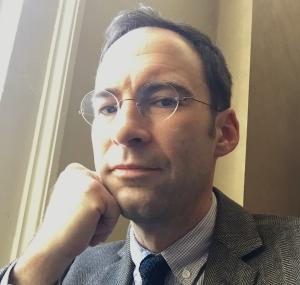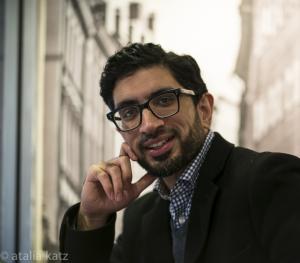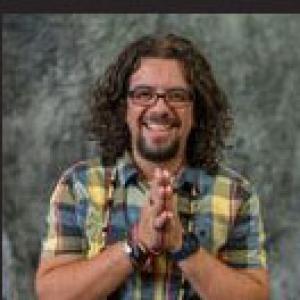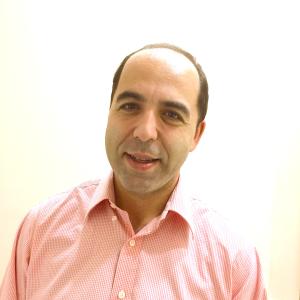Resources

I recently finished my fourth year of full-time teaching and I have noticed two consistent reactions that students have to course material in my Islam-focused courses (i.e., Islam, Islamic Mysticism, and The Qur’an): 1) Ability and willingness to readily acknowledge Islamophobia in American popular culture and 2) Appreciation for Sufi themes and literature. Although I may not have surmised how these two themes relate to one another pedagogically a few years back, I have come to see several connections and will use this blog post to explore some ways to take advantage of these student experiences in the classroom. Conscious and Unconscious Islamophobia Usually, on the first day of class, I write “Islam” on the board and solicit from students the first words that come to mind. Some hesitate to shout out “terrorism,” “anti-democratic” and the like, but I find that there are usually enough brave voices in the class to surface these collective social portrayals of the Muslim Bogeyman, and even evoke some cathartic laughter in the process. I find that this exercise, although rather straightforward, helps set a tone; it signifies to students that suppressing the obvious will hinder class discussion and probably their learning process as well. Much later in the semester, often in written assignments but sometimes in class discussions as well, I find a regular cadre of students admit—at times with a combination of shame and gratitude—how troubled they are to realize the Islamophobic views they have known, or found, in their own minds for who knows how long. This proves unsurprising, however, as many college students today were in diapers on 9/11 and therefore know nothing of a world without the “War on Terror.” It’s significant that these timid disclosures tend to occur toward the end of the semester, because no matter how easy it is for students to identify and caricaturize broad social concerns early on, it takes time to reflect on how stereotypes affect them on an individual level. Sufism and “Spiritual Jihad” When we explore various Sufi themes it’s easy enough, usually unprompted by their instructor, for students to draw some sort of personal meaning from the course material. When we read Ghazali’s (d. 1111) Deliverer from Error, for example, many students find it compelling as it reflects a perennial quest for spiritual truth. I’ll often screen episodes, as well, from the BBC production “The Retreat”—a three-part documentary that observes participants at a Sufi retreat in southern Spain; the cast includes multiple archetypal characters such as spiritual-but-not-religious, rigid dogmatist, addict of technology, and an atheist. Thus students can thus usually find themselves in one or more of the characters. In particular, a text I regularly teach is the 15th-century Sufi allegory, Yusuf and Zulaykha by ‘Abd al-Rahman Jami (d. 1492). Many of its central themes relate to challenges of confronting one’s inner demons, and it, therefore, offers some helpful models for students to consider as they confront their own latent or blatant preconceptions about Islam and Muslims. Yusuf and Zulaykha adapts the story of Yusuf (Joseph) from the 12th chapter of the Qur’an, except Jami’s version is much longer, has more details, and focuses on a love-struck female protagonist. Students often think she’s kind of crazy (or just crazy) because of her singular obsession with Yusuf. This obsession ultimately leads her to age physically and persist in a state of inconsolable grief. Eventually, however, once she realizes that it is not Yusuf per se whom she loves, but the divine reflection within Yusuf, her youthful beauty returns, she marries Yusuf, and they live happily ever after. The catalyst for her transformation takes place when she smashes the physical idols she had worshiped, which could symbolize the idols in her heart that had blocked her from True Love. Thus the story conveys useful pedagogical lessons on many levels: truth lies within us, it is we who block truth from becoming apparent, concealing the truth makes us sick and bitter, but also, our obsession with apparent manifestations of truth is highly seductive and difficult to ignore. Struggling Against the Machine One student in my Islamic Mysticism course wrote the following in a response paper late in the semester: “For those who approach this subject with any form of bias, I think must prepare for a clash of what we once viewed as fact with what we can now see as fact. This clash, for me at least, set forth a type of grief and shame.” I suspect that this student—like the protagonist in Yusuf and Zulaykha—arrived at his new perspective only after struggling deeply with his own shadows. Many Islamicists, including myself, find that teaching about Islam and Muslims requires students to go through a process of unlearning or de-programming—however you want to put it—the layers of fear and stereotypes that 21st-century media and society has drilled into their minds, often unconsciously. I think experiences like these are common—although in my own observations few students are willing to admit their feelings in this regard so candidly, even if they undergo similar transformations. What, then, is the best way to guide students through the sometimes-painful process of navigating those parts of themselves that aren’t so pretty? The more I teach, the more I find myself letting students gradually and gently acknowledge their own struggles, rather than relying on the megaphone of my teaching platform. My shift, in this regard—as I intimated the beginning of this post—has resulted from consistently observing students, out of their own volition, desiring to put forth the difficult effort it takes to look inward with honesty and circumspection. Thus the concept ofjihad al-nafs (spiritual struggle) in Sufi traditions—as illustrated in Yusuf and Zulaykha or any number of other scenarios—can allow students not only to draw personal connections to centuries-old texts but also appreciate the difficulties and rewards of challenging oneself to learn and grow amidst a cultural machine that discourages such an endeavor.

Theological school deans are not just theological leaders for their institution, they must be EDUCATIONAL leaders. That is, they must implement sound educational practices related to curriculum, instruction, supervision, assessment, and administration. There is a variety of ways to assess the effectiveness of the curriculum, and there are several levels of assessment (program-level, course-level, student testing, student projects, etc.). While faculty members can focus on course-level and individual student learning assessment, academic deans need to focus on program-level assessment in order to evaluate the effectiveness of the school's curricular course of study. Here are ten basic curriculum assessment tools every academic dean needs, nine are covered in previous posts: Outcomes alignment worksheet Syllabus assessment worksheet Curriculum maps Program-level rubrics Alumni survey Grade Distribution report Program retention and completion rate worksheets Entering student profile Graduating class profile Student course evaluations In this final entry of the series we review: 10. Student course evaluations that are worth the trouble Student course evaluations, a form of indirect assessment, can be a meaningful component of a school's formative assessment of its curriculum. Unfortunately, most course evaluation tools do not provide sufficiently meaningful data to be helpful. One evidence may be how difficult it is for most schools to collect meaningful data from the evaluations. Another is how students tend to see them as a chore, resulting in cursory responses and a low rate of return. Further, in most cases, the data collected rarely is analyzed at depth or used to prompt pedagogical actions for improvement in teaching and learning. Two approaches can help make course evaluations worth the trouble for students and for deans. First, a better-designed course evaluation tool, and second, a procedure that helps ensure a higher response rate. 1. A well-designed student course evaluation tool An effective student course evaluation tool will provide data and feedback that is meaningful. That is, the information from student feedback should address issues of pedagogy that are relevant, measurable, and actionable. For example, the mythical Central Generic Theological Seminary gathers the following clusters of information on its student course evaluations: (1) Student profile information (2) Feedback on program-level goals (3) Feedback on instruction and pedagogy (4) Feedback on instructor effectiveness (5) Feedback on the relevance of the course to the practice of ministry (6) Feedback on program and learning integration. In order to make these clusters meaningful, the instrument focuses on instructional effectiveness and curricular program goals, not on what students "like" or "enjoyed." Additionally, the clusters of items are co-factored to yield meaningful interpretation. See the attached "Anatomy of a Student Course Evaluation Tool" which shows how the instrument is structured by clusters and for co-factor analysis. Download Anatomy of student evaluation Once the student evaluations are collected (CGTS uses its learning management system (LMS) for its course evaluations) the dean prepares an aggregate report for the Faculty. The aggregate report includes a comparison of selected items over the course of several semesters. The comparison focuses on areas targeted for improvement based on the student evaluations. Here are some examples: In Example 1 the dean compares student responses to degree program goal 1.A across two semesters. Additionally, the report compares two related items by gender. In Example 2 the dean highlights three instructional items related to coursework (knowledge, principles, skills) and compares the responses over three semesters. This report item shows improvement in the most recent semester indicating that the interventions faculty members applied in their courses to address these issues are having a positive effect. In Example 3 the dean compares a cluster of items related to instruction over three semesters. This feedback becomes important for the Faculty of CGTS in helping it realize the need to be more overt in applying pedagogical strategies that help students be more aware of the course learning objectives and to create learning experiences that yield a higher response from students about achieving the course outcomes. As a result of this feedback, the dean led the Faculty in applying teaching and learning practices to increase the effectiveness of these items. You can download a copy of the student course assessment questionnaire here 2. A rigorous procedure for assessment The second strategy employed by CGTS is the implementation of policies and procedures that help ensure a high rate of return on student course evaluations. The school's policy makes completion of the student course evaluation part of the course completion requirements. Students who do not complete the course evaluation do not receive a grade for the course. Additionally, the school has put in place the procedures to help ensure this indirect assessment data set is part of the formative assessment plan. A Student Course Evaluation Sample Here is a sample of student course evaluation questions with questions that cover the various clusters for co-factor analysis. Download Student Course Evaluation sample

Tat-siong Benny Liew Class of 1956 Professor in New Testament Studies College of the Holy Cross At the Annual Meeting of the Society of Biblical Literature last year, the Student Advisory Board organized an interesting session titled, “What I’m Telling My Students.” I find this a wonderful question for every

Joshua Canzona Georgetown University In his “Homage to Joe Sacco,” Edward Said celebrates the author of Palestine and gives us one of the best love letters to comics ever written. He shares his first comic book experience, “Everything about the enticing book of colored pictures, but specially its untidy, sprawling.

Martin Nguyen Associate Professor, Faculty Chair for Diversity Fairfield University In a time when it is of paramount importance to assert and witness that black lives matter, how do we go about preparing our Islam courses that all too often afford little to no time at all for the societal.

Caleb Elfenbein Assistant Professor Grinnell College Don’t we all have moments when we want to, or perhaps feel like we should, set aside a class session plan in lieu of discussing a pressing event or development? Despite the vast array of subjects that we teach within the broader field of..

Tat-siong Benny Liew Class of 1956 Professor in New Testament Studies College of the Holy Cross It is that time of the year. After weeks and months of class sessions and office hours, the spring semester is now over. There is, of course, something left for us teachers to do

Youshaa Patel Assistant Professor of Religious Studies Lafayette College These days, Islam is no stranger to controversy. Although we may deplore the mainstream media’s deliberate sensationalization of Muslim conflicts, as professors we can also exploit conflict in the classroom to help our students achieve their learning objectives. Many of my.

Cláudio Carvalhaes Associate Professor McCormick Theological Seminary At the heart of education, the most important “instrument” of our lives, the house we inhabit, is the very core of our selves: our bodies. Fully! It is in and through our bodies that we learn and are able to unlearn. The immense.

Eren Tasar Assistant Professor University of North Carolina at Chapel Hill I remember how dumbfounded I was the first time a student told me he had grown up believing Catholics were not Christian. He had never, moreover, heard of the Orthodox Church, the only form of Christianity recognized by most